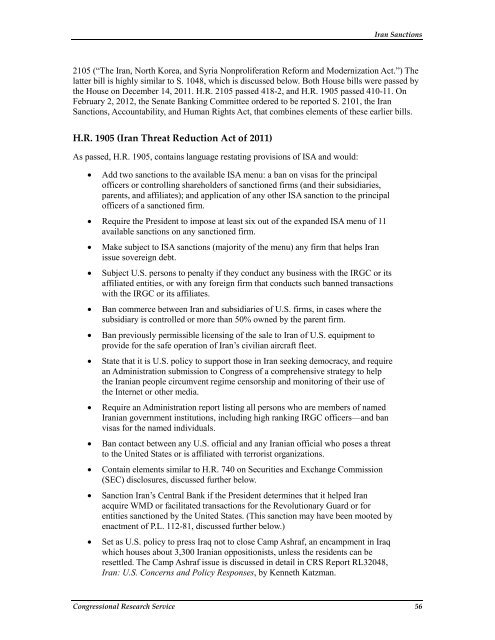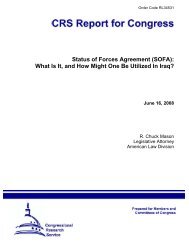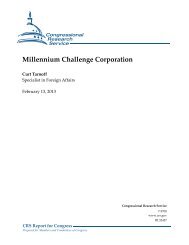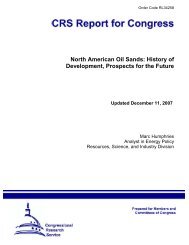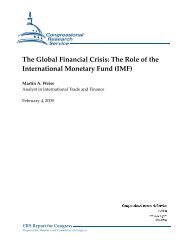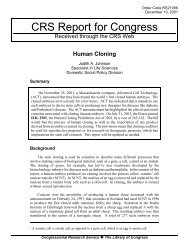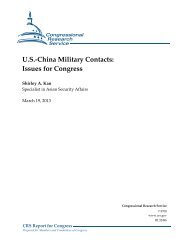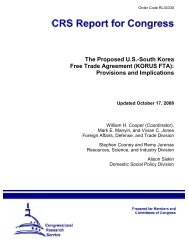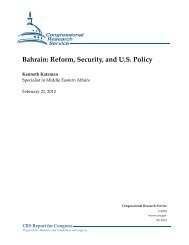Iran Sanctions - Foreign Press Centers
Iran Sanctions - Foreign Press Centers
Iran Sanctions - Foreign Press Centers
You also want an ePaper? Increase the reach of your titles
YUMPU automatically turns print PDFs into web optimized ePapers that Google loves.
<strong>Iran</strong> <strong>Sanctions</strong><br />
2105 (“The <strong>Iran</strong>, North Korea, and Syria Nonproliferation Reform and Modernization Act.”) The<br />
latter bill is highly similar to S. 1048, which is discussed below. Both House bills were passed by<br />
the House on December 14, 2011. H.R. 2105 passed 418-2, and H.R. 1905 passed 410-11. On<br />
February 2, 2012, the Senate Banking Committee ordered to be reported S. 2101, the <strong>Iran</strong><br />
<strong>Sanctions</strong>, Accountability, and Human Rights Act, that combines elements of these earlier bills.<br />
H.R. 1905 (<strong>Iran</strong> Threat Reduction Act of 2011)<br />
As passed, H.R. 1905, contains language restating provisions of ISA and would:<br />
• Add two sanctions to the available ISA menu: a ban on visas for the principal<br />
officers or controlling shareholders of sanctioned firms (and their subsidiaries,<br />
parents, and affiliates); and application of any other ISA sanction to the principal<br />
officers of a sanctioned firm.<br />
• Require the President to impose at least six out of the expanded ISA menu of 11<br />
available sanctions on any sanctioned firm.<br />
• Make subject to ISA sanctions (majority of the menu) any firm that helps <strong>Iran</strong><br />
issue sovereign debt.<br />
• Subject U.S. persons to penalty if they conduct any business with the IRGC or its<br />
affiliated entities, or with any foreign firm that conducts such banned transactions<br />
with the IRGC or its affiliates.<br />
• Ban commerce between <strong>Iran</strong> and subsidiaries of U.S. firms, in cases where the<br />
subsidiary is controlled or more than 50% owned by the parent firm.<br />
• Ban previously permissible licensing of the sale to <strong>Iran</strong> of U.S. equipment to<br />
provide for the safe operation of <strong>Iran</strong>’s civilian aircraft fleet.<br />
• State that it is U.S. policy to support those in <strong>Iran</strong> seeking democracy, and require<br />
an Administration submission to Congress of a comprehensive strategy to help<br />
the <strong>Iran</strong>ian people circumvent regime censorship and monitoring of their use of<br />
the Internet or other media.<br />
• Require an Administration report listing all persons who are members of named<br />
<strong>Iran</strong>ian government institutions, including high ranking IRGC officers—and ban<br />
visas for the named individuals.<br />
• Ban contact between any U.S. official and any <strong>Iran</strong>ian official who poses a threat<br />
to the United States or is affiliated with terrorist organizations.<br />
• Contain elements similar to H.R. 740 on Securities and Exchange Commission<br />
(SEC) disclosures, discussed further below.<br />
• Sanction <strong>Iran</strong>’s Central Bank if the President determines that it helped <strong>Iran</strong><br />
acquire WMD or facilitated transactions for the Revolutionary Guard or for<br />
entities sanctioned by the United States. (This sanction may have been mooted by<br />
enactment of P.L. 112-81, discussed further below.)<br />
• Set as U.S. policy to press Iraq not to close Camp Ashraf, an encampment in Iraq<br />
which houses about 3,300 <strong>Iran</strong>ian oppositionists, unless the residents can be<br />
resettled. The Camp Ashraf issue is discussed in detail in CRS Report RL32048,<br />
<strong>Iran</strong>: U.S. Concerns and Policy Responses, by Kenneth Katzman.<br />
Congressional Research Service 56


